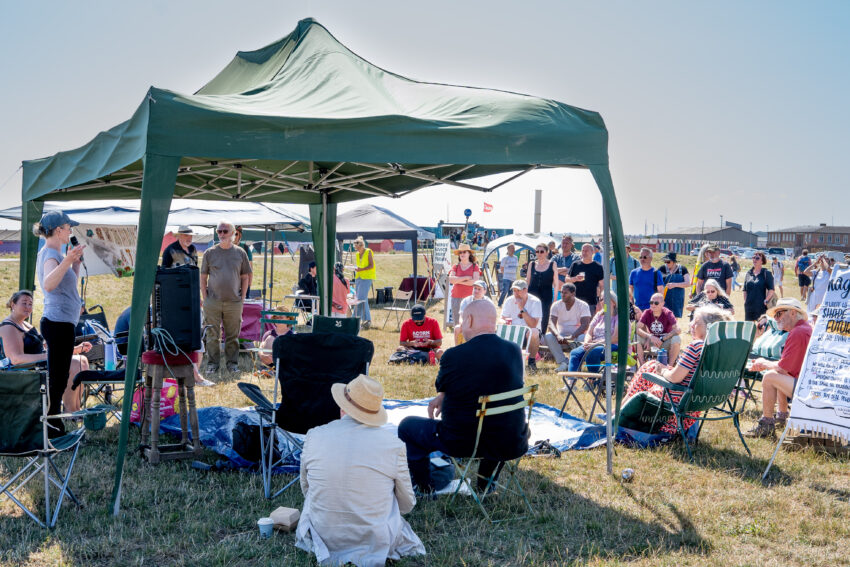Text: Ethan Oshoko. Photo: @sonskaphotographystudio
On Sunday the 13 July, residents from all over Hastings and St Leonards came together on the old bathing pool site in West St Leonards, in order to demonstrate two things:
First, they demonstrated that developers will not be allowed to take public land and exploit it purely for profit without seeing resistance from the community.
Second, they demonstrated that what cherished green spaces remain unconcreted can provide us with an excellent place to gather together and foster social bonds.
The event was underpinned by the theme of communities versus developers: the necessary struggle for communities to make their voices heard and have their needs met, versus the wants of the developers, who primarily pursue financial benefits to the detriment of the actual people living in the town. However, it wasn’t all politics.
There was live music, a speakers’ corner, morris dancing, cheerleading, face-painting, a community versus developers tug of war event (guess who won) and free food, including hot dogs and delicious beetroot borscht. The speaker’s corner was not simply about the bathing pool site issues but also discussed ecology in local spaces, the housing crisis and disability rights. It’s also worth noting that the protestival was wheelchair accessible. If a grassroots festival can make their event accessible, why do so many venues with access to both private and public funds remain inaccessible?
Some attendees were surprised that they didn’t need to pay for the food. We are so accustomed to public spaces being used solely for commercial exchange that free food appears to us as an unthinkable novelty. Even the folding tables, gazebos and camping chairs were happily crowdsourced by the organisers of the festival.
One attendee, Felix Lozano, “greatly enjoyed the community connection of the day, including meeting old friend ‘Steve the Anarchist’.”
Lucille, the founder of SOBS (Save Our Bathing pool Site), who has lived in St Leonards for over twenty years, said the event showed that they were: “able to use the space in a way that [she envisions] should be possible moving forward”. One highlight for Lucille was ”seeing people that wouldn’t have come across each other”. Since green public spaces are accessible to all, they provide a great way for people to socialise with those they may not normally meet, which fosters community bonds. A luxury housing development, on the other hand, is likely to make people more insular and lead to a more polarised community. She also noted that “[People in West St Leonards] haven’t got anywhere for pop-up events that aren’t on concrete.”
Lynne Salvage, who manned the New Left Party stall, remarked that “the festival was a great success!” She was impressed that the whole event came together after only one organising meeting, where locals co-ordinated on supplying tables, camping chairs, food, audio equipment, gazebos and the various necessities for putting on such an event. Lynne said the festival was “a testament to local action groups working together for a common cause, and a great example of how experienced community organisers can make things happen without funding.”
Discussions around social justice often focus on labour rights and discrimination (rightfully so), but the importance of public spaces, like beaches, parks and green spaces, where we all have an equal right to use however we please without being expected to purchase anything or to work – essentially a space, away from our homes, where we are not simply consuming or labouring – is often overlooked.
The urban sociologist Robert Park once wrote: “If the city is the world which man created, it is the world in which he is henceforth condemned to live.” If a city, or town, is created not to meet the needs of the people who live in it, but built to serve the wants of the wealthy, then we have no choice but to reject that situation as undemocratic. Furthermore, a town in which every space is used for commercial rather than social means shapes us and how we understand each-other in ways we are not even conscious of. A society where every public space is centered around transactions inevitably leads to a culture where people treat each other in a transactional manner, which inevitably hollows out social life and makes fruitful living impossible.

